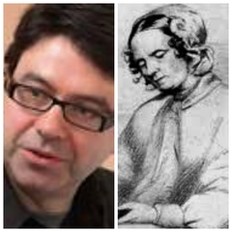|
Back
By the Rivers of Shannon, There We Wept New York
Merkin Concert Hall, Kaufman Music Center
09/19/2019 -
Eartheater: When Fire is Allowed to Finish (Arranged and orchestrated by Aaron Parker, Steven Snowden, Conrad Winslow)
Donnacha Dennehy: The Hunger
Katherine Manley (Asenath Nicholson), Iarla O Lionáird (The Man)
Erin Lesser (Flutes), Alarm Will Sound, Alan Pierson (Conductor and Artistic Director)

D. Dennehy/A. Nicholson
“...mothers murdering their own children in their lunacy, some dying of mere grief as a passion...others frightened into idiotism.
I wish I could repeat the very sound of those groans and of those exclamations that I heard from some poor dying creatures when in the height of their agonies...and that I could make them that read this hear, as I imagine I now hear them, for the sound seems still to ring in my ears.”
Daniel Defoe (1660-1731), A Journal of the Plague Year
The singular words of Daniel Defoe's novel resonate through history. One heard the sobs of Canaanite women and children, slaughtered by the orders of God, or prayers where Israelites wept by the waters of Babylon. One listens to hopeless cries today from Yemeni families bombed by the Saudis, or chanted by genocidal victims in Aleppo and Kandahar and Mosul, or Spanish children and parents sobbing in American prison camps.
And in 1845 to 1852, the farmers of Ireland died in the thousands or tens of thousands, while their British overlords ignored them or picked up the scraps of potatoes from the great famine and exported them abroad.
Today we can read about these horrors from history books. Irish composer Donnacha Dennehy studied dozens of first-person accounts of the horrors and then found to his surprise, an American lady who traveled to Ireland as the Irish fled to America. Asenath Nicholson was an extraordinary humanist, and her book, Annals of the Famine in Ireland, published in 1851, was (in composer Dennehy’s words) “a route unlocked for me.”
It is Nicholson’s words–touching, practical, compassionate, alarmed–with an Irish man who is dying as his children die, as he prays to the Apostles, and above all, to the Lamb–which form Mr. Dennehy’s concert version of his mixed-media opera, The Hunger.
Two nights ago, I was spiritually moved by the music of Alfred Schnittke and Arvo Pärt in the crypt of an uptown church. Last night was far more important, because Mr. Dennehy’s audio-visualization was not of the spirit but of E.E. Cummings’s creature, “this monster ManUnkind.”

I. O Lionáird/K. Manley (© Realworld Records/Paul Foster-Williams)
On opposite sides of the Alarm Will Sound band (more on them later) stood British soprano Katherine Hanley and Irish singer Iarla O Lionáird. She was dressed in a sharp black dress, sung in English, was articulate, her voice rising with emotion, or lowering in despair. She was actress as well as singer. Her hands told the story, her face was sad, unbelieving.
Ms. Nicholson’s book had dealt with dozens and dozens of the “peasantry” (her 19th Century forgivable word), but Mr. Dennehy’s libretto brought that down to one man.
The “man” was sung–or keened in a special old-Irish language and music called sean-nòs (old style). Iarla O Lionáird is famed in Ireland for his voice and his multitude of Irish styles. In The Hunger, Mr. Lionáird was dressed informally, his voice lamenting at times, singing at times. Where Ms. Hanley gave apt descriptions, Mr. Lionáird in Gaelic prayed to various incarnations of Jesus, desponded of help, let us know that his wife Nellie was already dead, that his children were dying, that the “official:” aid agency couldn’t help him because his name wasn’t on the list.
In a way, the closest music to this was Gavin Bryars’ incredible Jesus Blood Never Failed Me Yet, but the Gaelic language gave it special impetus.
Like Gustav Mahler’s song cycles for two soloists, the voices of Lionáird and Hanley never come together. Except in two cases, where they sang as one, and where Ms. Hanley doffed her American do-gooder stance and became her Irish counterpart. These are stirring moments. These are moments when the power, of the bilingual words, the terror of humanity’s inhumanity, the truth of famine and the sheer personal artistry are almost overpowering.
Behind the voices was Alarm Will Sound, were those 20-odd brilliant musicians under the baton of Alan Pierson. This was a music of unending throbbing. Not lyrical, rarely soloistic, but a tormenting tapestry of overlaying harmonies, intensity, unending blocks of sound intercepting each other. Not even attempting to reflect the words of this...er, cantata (I can’t think of another word). But underlying the whole schemata like a cosmic force.
Having ignored the original operatic production of The Hunger, I should be flailing myself with a hardwood shillelagh. Yet that was a documentary opera, with interviews, videos, with all the background necessary to understand this great famine. With this concert version, one heard, with all understated violence of hunger, a hopelessness, a horror and in the last words, the powerlessness which continues to this day.
The Hunger was proceeded with a work written originally for voice by one Eartheater (a.k.a. Alexandra Drewchin), who described her When Fire is Allowed to Finish as a piece about her problems of lost love, and whether or not to commit suicide. The original melodies had been orchestrated and arranged quite deftly, allowing Ms. Eartheater’s troubles to be enunciated by flautist Erin Lesser, leaving little impression.
Then again it was unfair to pair Eartheater’s (Ear-Theater’s?) personal grief with the suffering of humanity, encapsulated in Donnacha Dennehy’s great work. Listening to the sounds of the vocalists and the tremors of the orchestra, one realizes that dollars and love, dolors, religion and music itself are deceptive illusions compared to the truth of starvation itself.
Harry Rolnick
|